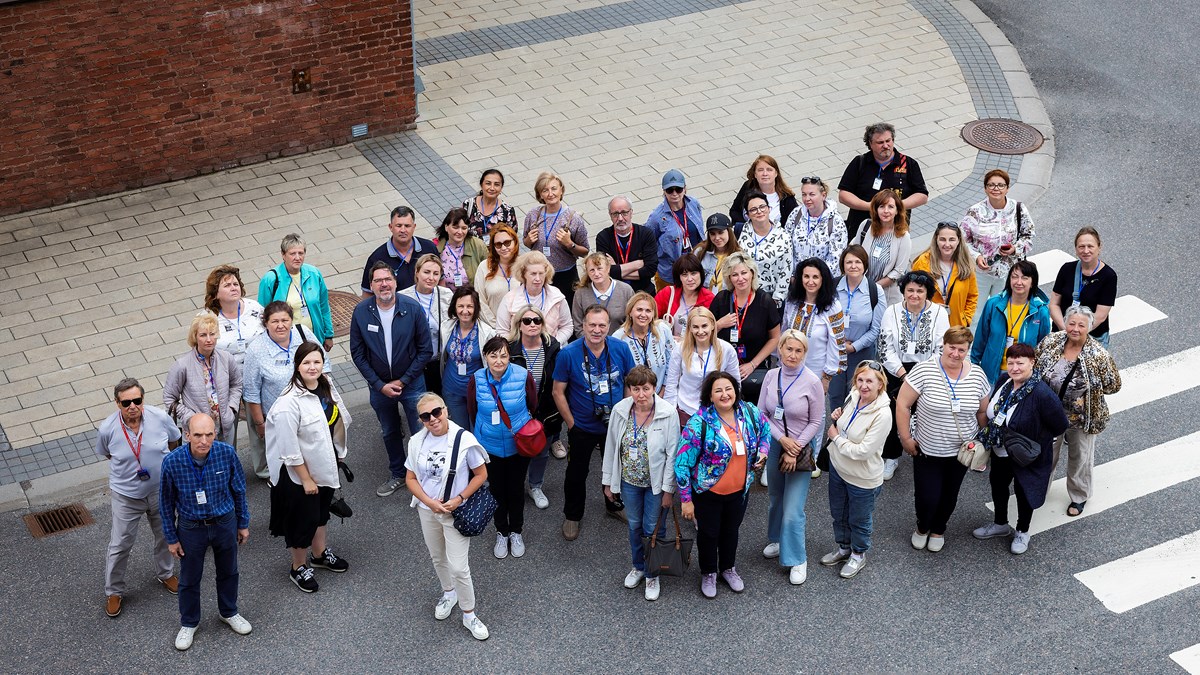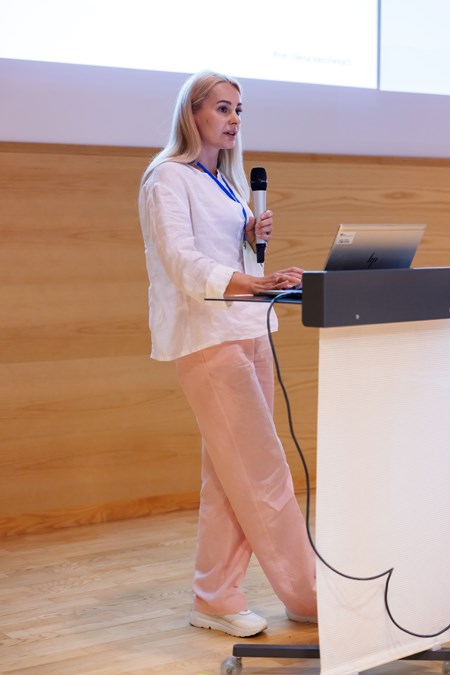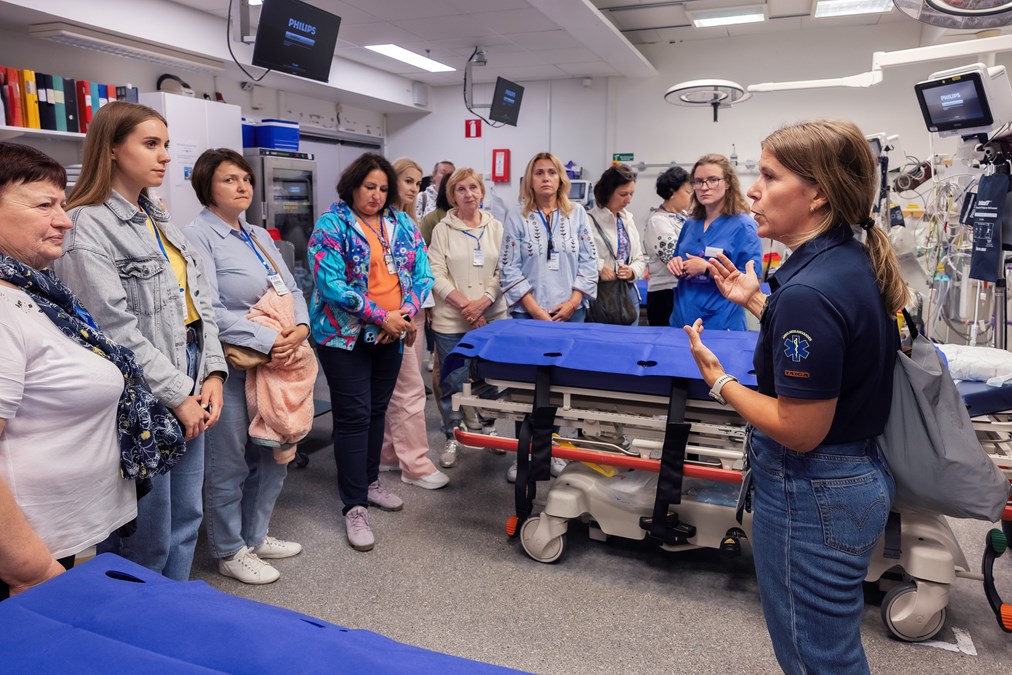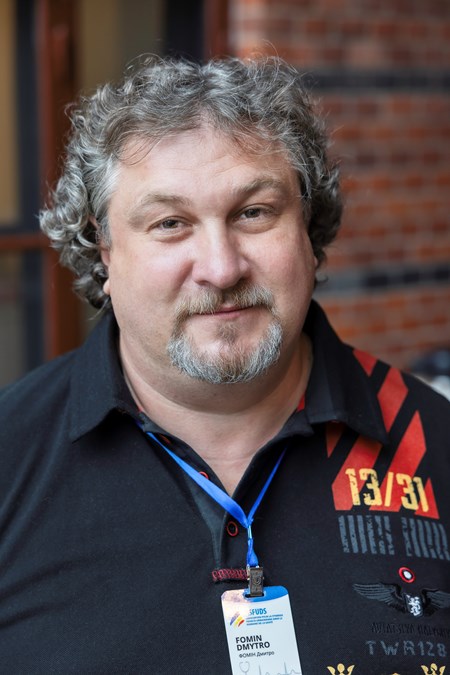Ukrainian healthcare staff visited Sahlgrenska University Hospital

Yesterday 42 doctors and nurses from 10 different hospitals and universities in Ukraine visited Sahlgrenska University Hospital. One of several stops on the study tour to various Scandinavian hospitals. A brief respite from the brutality of war.
- As you can see, there are almost only women with us here today. The men are fighting on the front line, says Olena Vavrinevych, Professor at the Bogomolets National Medical University in Kiev.

Her voice breaks as she continues to talk about the war's impact on society, preschools and hospitals that have been destroyed. Several in the room begin to cry.
It is Wednesday, July 5, and they are in the Heart auditorium at Sahlgrenska University Hospital. A few days ago these 42 doctors and nurses were in Ukraine and in a few days they will be back. The brutality of war is reminded, even when they are geographically distant.
Swedish healthcare - better than expected
In the first part of the program, the visitors heard about the path to specialist training and what residency looks like in Sweden. Valeriia Onutse, a war refugee from Ukraine who now works as a medical assistant at Sahlgrenska University Hospital and has her sights set on doing a residency in radiology, talked about her journey. They also got an insight into the hospital's preparedness work and new residency in preparedness and disaster medicine.
But what left an impression above all were the tour around the hospital, to the Operating rooms at the Imaging and Intervention Center, the Intensive Care Unit and the Emergency Department. The image of Swedish healthcare with challenges due to it being such a large, elongated country with a small population changed during the visit.
- There is a high level at Sahlgrenska University Hospital, states Dmitro Fomin, surgeon and hospital director Multidisciplinary Hospital of Intensive Care of Lyubashivka, Odesa region.
- It was useful to see how you sort and prioritize patients in the emergency department. All the equipment in the emergency department is easily accessible, it was orderly and clean, better than what I have seen in France, Dmitro continues.
Martin Hubrich, Head of Special Operations Section; Hanna Chin, Senior specialist at the ICU and Emma Lukic, Senior specialist Emergency medicine, guided the groups through the hospital's premises.
- So many emotions! exclaims one of the participants after the visit to the state of the art operating rooms.
The everyday life of healthcare workers in Ukraine
It is important to remember that the war has been going on since 2014. Even then, Dmitro Fomyn worked as a volunteer and operated on patients in eastern Ukraine.
- The war has changed. They are using much more powerful weapons now that injure more people for life.
Last year, the war came very close to the hospital where Dmitro works.
-We waded in blood in the emergency room and many patients came in who had lost body parts. Unfortunately, some were so injured that nothing could be done, we had to put them aside to save others.
If it is possible to mention something positive about the last 1.5 years, it is the mobilization among the residents.
- People are more determined and take action.
He is the director of a hospital located between Kiev and Odessa. Because of the location, they receive many trauma and surgery patients. When asked about the need in the hospital going forward, he answers:
- We are planning to start up a dialysis unit and it needs to be equipped. But the truth is that since we are a hospital that must always be ready to receive all patient cases, we are also in need of all types of equipment, concludes Dmitro.
It is 4 p.m. and three intense hours are over. Sahlgrenska International Care and Welcome Services have coordinated the visit together with Help Ukraine Gothenburg, which assisted with interpretation support. Today's realization is how important it is to have respite and the opportunity to exchange knowledge with colleagues from other countries, even in the midst of a burning war. And how much commitment is, and has been, from employees at Sahlgrenska University Hospital, to support Ukraine in every way the hospital can.
Facts
About a month ago, the Association for the French-Ukrainian Synergy in the Healthcare Field (ASFUDS) contacted Sahlgrenska University Hospital. The organization was founded in 2009 by a Ukrainian doctor who works in France. In cooperation with the Ukrainian Society of Medicine, study visits to France for Ukrainian healthcare staff are organized at regular intervals.
Despite the ongoing war, it was important for the organization to continue exchanges with healthcare in other countries and the aim this time was to learn more about healthcare in Scandinavia. During the trip, the delegation visits hospitals in Stockholm, Oslo, Copenhagen and Gdansk.
On July 5, the delegation of 42 doctors and nurses from more than 10 hospitals and universities in Ukraine visited Sahlgrenska University Hospital.
The organization Help Ukraine Gothenburg assisted with interpretation support.
Read more about how Sahlgrenska University Hospital supports Ukraine:
Sahlgrenska International Care International aid assistance 2022 (vgregion.se)